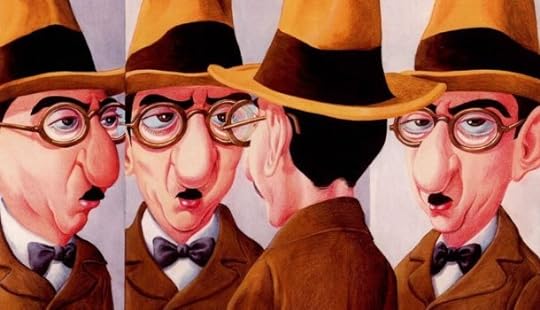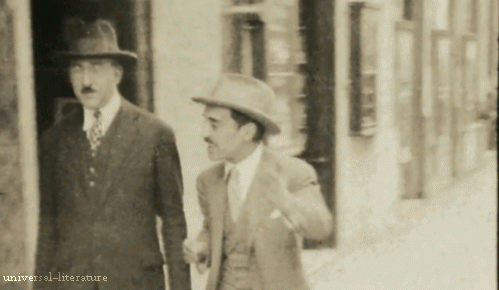What do you think?
Rate this book


544 pages, Paperback
First published January 1, 1982



And so, not knowing how to believe in God and unable to believe in an aggregate of animals, I, along with other people on the fringe, kept a distance from things, a distance commonly called Decadence. Decadence is the total loss of unconsciousness, which is the very basis of life.
And so we were left, each man to himself, in the desolation of feeling ourselves live. A ship may seem to be an object whose purpose is to sail, but no, its purpose is to reach a port. We found ourselves sailing without any idea of what port we were supposed to reach. Thus we reproduced a painful version of the Argonauts’ adventurous precept: living doesn’t matter, only sailing does.
To recognize reality as a form of illusion and illusion as a form of reality is equally necessary and equally useless…

„Alții sînt mari seducători cărora nu îndrăznesc să le reziste nici măcar femeile inexistente”.
„Singura atitudine demnă de un om superior este să persiste cu tenacitate într-o activitate pe care o știe inutilă, să respecte o disciplină pe care o știe sterilă și să folosească norme de gîndire filosofică și metafizică despre care simte că n-au nici o importanță” (p.122).
'We're well aware that every creative work is imperfect and that our most dubious aesthetic contemplation will be the one whose object is what we write. But everything is imperfect. There's no sunset so lovely it couldn't be yet lovelier, no gentle breeze bringing us sleep that couldn't bring yet sounder sleep.'
'I've never done anything but dream. This, and this alone, has been the meaning of my life. My only real concern has been my inner life. My worst sorrows have evaporated when I've opened the window on the street of my dreams and forgotten myself in what I saw there.'
'I read and I am liberated. I acquire objectivity. I cease being myself and so scattered. And what I read, instead of being like a nearly invisible suit that sometimes oppresses me, is the external world’s tremendous and remarkable clarity, the sun that sees everyone, the moon that splotches the still earth with shadows, the wide expanses that end in the sea, the blackly solid trees whose tops greenly wave, the steady peace of ponds of farms, the terraced slopes with their paths overgrown with grape-vines.'
'My tedium takes on an air of horror, and my boredom is a fear. My sweat isn’t cold, but my awareness of it is. I’m not physically ill, but my soul’s anxiety is so intense that it passes through my pores and chills my body.'
'It sometimes occurs to me, with sad delight, that if one day (...) the sentences I write are read and admired, then at last I'll have my own kin, people who 'understand' me, my true family in which to be born and loved.'
'What can China give me that my soul hasn't already given me? And if my soul can't give it to me, how will China give it to me? For it's with my soul that I'll see China, if I ever see it. I could go and seek riches in the Orient, but not the riches of the soul, because I am my soul's riches, and I am where I am, with or without the Orient.'
'It's the central error of the literary imagination: to suppose that others are like us and must feel as we do. Fortunately for humanity, each man is just who he is, it begin given only to the genius to be others as well.'.
'My intellect has attained a pliancy and a reach that enable me to assume any emotion I desire and enter at will into any state of mind.'
'Live your life. Don’t be lived by it. Right or wrong, happy or sad, be your own self. You can do this only by dreaming, because your real life, your human life, is the one that doesn’t belong to you but to others. You must replace your life with your dreaming, concentrating only on dreaming perfectly. In all the acts of your real life, from that of being born to that of dying, you don’t act – you’re acted; you don’t live – you’re merely lived.'
“Each drop of rain is my failed life weeping in nature. There’s something of my disquiet in the endless drizzle, then shower, then drizzle, then shower, through which the day’s sorrow uselessly pours itself out over the earth. It rains and keeps raining. My soul is damp from hearing it. So much rain… My flesh is watery around my physical sensation of it.
'What will I be ten years from now, or even five? My friends say I'll be one of the greatest contemporary poets - they say this based on what I've written, not what I may yet write. But even if this is true, I have no idea what it will mean. I have no idea how it will taste. Perhaps glory tastes like death and futility, and triumph smells of rottenness.'
“Y así soy, fútil y sensible, capaz de impulsos violentos y absorbentes, malos y buenos, nobles y viles, pero nunca de un sentimiento que subsista, nunca de una emoción que prolongue y entre hasta la sustancia del alma. Todo en mí es tendencia para ser a continuación otra cosa; una impaciencia del alma consigo misma, como un niño inoportuno; un desasosiego siempre creciente y siempre igual. Todo me interesa y nada me cautiva.”
”Quiero ser tal como quise ser y no soy. Si viviera, me destruiría. Quiero ser una obra de arte, del alma por lo menos, ya que del cuerpo no puedo serlo. Por eso no me esculpí en calma y en extrañamiento y me coloqué en invernadero, lejos de los aires frescos y de las luces claras– donde mi artificiosidad, flor absurda, pueda florecer en lejana belleza.”
“Feliz quien no exige de la vida más de lo que ella espontáneamente le ofrece, dejándose guiar por el instinto de los gatos, que buscan el sol cuando hay sol, y, cuando no lo hay, el calor donde quiera que el calor se encuentre. Feliz quien renuncia a su personalidad con la imaginación, y se deleita en la contemplación de las vidas ajenas, viviendo, no todas las impresiones, sino el espectáculo exterior de todas las impresiones ajenas. Feliz, en fin, el que renuncia a todo, y al que, por renunciar a todo, nada le puede ser ni arrebatado ni reducido (…) El campesino, el lector de relatos, el asceta puro—estos tres son los que viven una vida feliz, porque son estos tres los que renuncian a la personalidad— uno porque vive del instinto, que es impersonal, otro porque vive de la imaginación, que es olvido, el tercero porque no vive y, no habiendo muerto, duerme.”
“Necesito acorazarme contra la vida. Como todo estoicismo no pasa de un severo epicureísmo, deseo hacer en lo posible que mi desgracia me divierta. No sé hasta qué punto lo consigo. No sé hasta qué punto consigo alguna cosa. No sé hasta qué punto existe alguna cosa que pueda conseguirse... En el fondo, nada de esto es estoico. Es sólo en las palabras donde reside la nobleza de mi sufrimiento. Me quejo, como una criada enferma. Me atormento como un ama de casa. Mi vida es completamente fútil y absolutamente triste.”
“Siempre quise agradar. Siempre me dolió que me mostraran indiferencia. Huérfano de la Fortuna, tengo, como todos los huérfanos, la necesidad de ser objeto del cariño de alguien. Pasé siempre hambre de la realización de esa necesidad. Tanto me adapté a esa hambre inevitable que, a veces, ni sé si siento la necesidad de comer... Juzgo a veces que me gusta sufrir. Pero, francamente, yo preferiría otra cosa.”




If I write what I feel, it’s to reduce the fever of feeling. What I confess is unimportant, because everything is unimportant. I make landscapes out of what I feel. I make holidays of my sensations. (42)
He who does not know how to populate his solitude, does not know either how to be alone in a busy crowd.
- Charles Baudelaire, Crowds
Lucid Diary
My life: a tragedy booed off stage by the gods, never getting beyond the first act.
Friends: not one. Just a few acquaintances who imagine they feel something for me and who might be sorry if a train ran over me and the funeral was on a rainy day. The logical reward of my detachment from life is the incapacity I’ve created in others to feel anything for me. There’s an aureole of indifference, an icy halo, that surrounds me and repels others. I still haven’t succeeded in not suffering from my solitude. It’s hard to achieve that distinction of spirit whereby isolation becomes a repose without anguish... (579)
I envy – but I’m not sure that I envy – those for whom a biography could be written, or who could write their own. In these random impressions, and with no desire to be other than random, I indifferently narrate my factless autobiography, my lifeless history. These are my Confessions, and if in them I say nothing, it’s because I have nothing to say. (42)
Each drop of rain is my failed life weeping in nature. There’s something of my disquiet in the endless drizzle, then shower, then drizzle, then shower, through which the day’s sorrow uselessly pours itself out over the earth.
It rains and keeps raining. My soul is damp from hearing it. So much rain... (177)
Solitude devastates me; company oppresses me. (80)
Again, fluid and uncertain, the rain pattered. Time dragged to its accompaniment. My soul’s solitude grew and spread, invading what I felt, what I wanted, and what I was going to dream. The room’s hazy objects, which shared my insomnia in the shadows, moved with their sadness into my desolation. (285)
And so, not knowing how to believe in God and unable to believe in an aggregate of animals, I, along with other people on the fringe, kept a distance from things... Could it think, the heart would stop beating. (30)
I've never had anyone I could call ‘Master’. No Christ died for me. No Buddha showed me the way. No Apollo or Athena, in my loftiest dreams, ever appeared to enlighten my soul. (533)
A breath of music or of a dream, of something that would make me almost feel, something that would make me not think. (57)
I sleep when I dream of what doesn't exist; dreaming of what might exist wakes me up. (179)
Flow lightly, life that does not even feel itself, a silent, supple stream beneath forgotten trees! Flow softly, soul that does not know itself, a murmur hidden from view by great fallen branches! Flow vainly, aimlessly, consciousness conscious of nothing, a vague, distant glimmer through leafy clearings, with no known source or destination. Flow on, flow on and leave me to forget!
Between myself and life there have always been panes of opaque glass, undetectable to me by sight or touch; I never actually lived life according to a plan, I was the daydream of what I wanted to be, my dream began in my will, my goal was always the first fiction of what I never was.
I am, for the most part, the very prose that I write. I shape myself in periods and paragraphs, I punctuate myself and, in the unleashed chain of images, I make myself king, as children do, with a crown of made from a sheet of newspaper or, in finding rhythms in mere strings of words, I garland myself, as madmen do, with dried flowers that in my dreams still live.
The pain of not understanding the mystery of life, the pain of being unloved, the pain of others’ injustice to us, the pain of life crushing us, suffocating and imprisoning us…
These pages are the doodles of my intellectual consciousness of myself. I set them down in a torpor of feeling, like a cat in the sun, and re-read them at times with a dull, belated pang, as if remembering something I had always previously forgotten.
